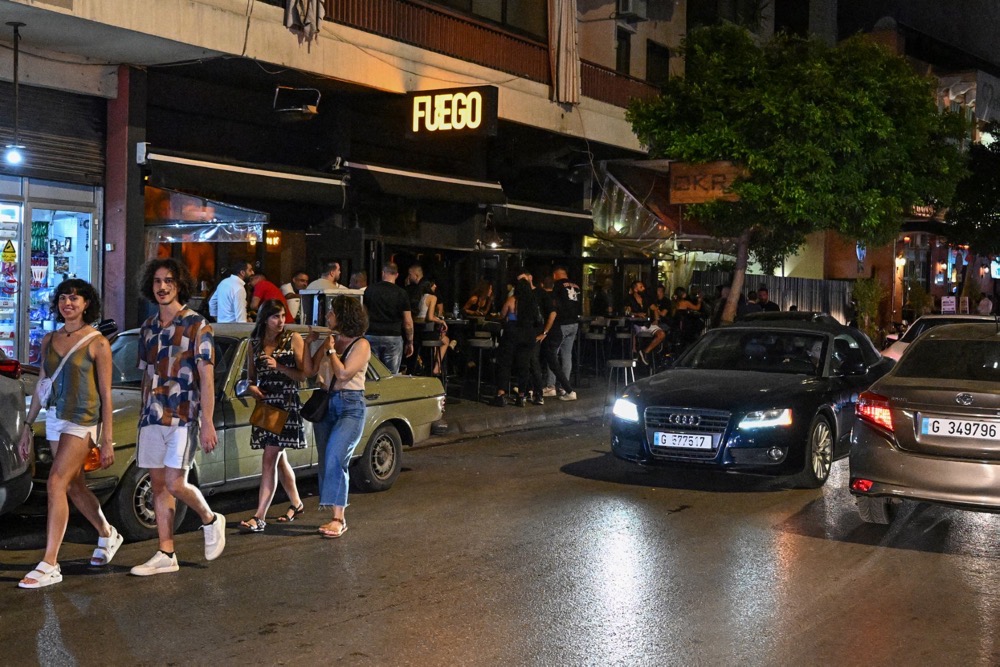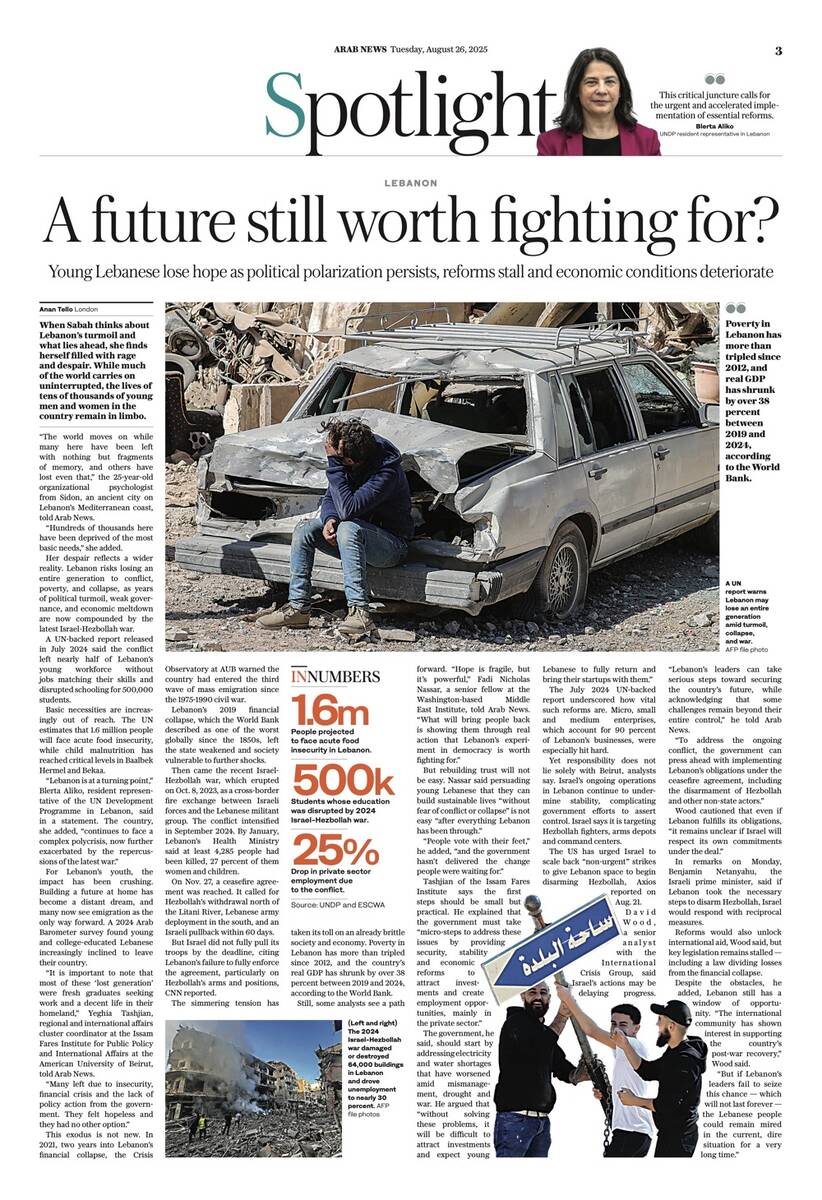BRASILIA: With millions of people of Lebanese descent living in Latin America — certain analysts think there are more people of Lebanese ancestry in Brazil alone than in Lebanon itself — the number of Latin Americans in Lebanon is equally high.
Since the Israeli attacks on southern Lebanon and on Beirut intensified, countries like Colombia and Brazil have sent planes to rescue groups of their citizens.
A massive evacuation from cities near the border with Israel has been ordered by the invading forces over the past few days. At least 70 towns have been included in the evacuation list by Israel. The strikes on Beirut led hundreds of thousands of people to move as well.
In many such locations, there are groups of Latin American families, many the sons and daughters of Lebanese immigrants to the New World who decided to go back to their parents’ homeland.
Cases of Latin American women, with or without Lebanese ancestry, who married Lebanese men in Latin America and decided to move with them to Lebanon are also pretty common.
That is the case with Leni Souza, a 48-year-old Brazilian woman from Parana state, which has one of the largest Lebanese communities in Brazil.
Souza spent her childhood in Foz do Iguacu, on the border with Ciudad del Este in Paraguay, and Puerto Iguazu, in Argentina, an area with hundreds of thousands of Lebanese nationals. She met her husband, a Lebanese-born man with dual (Lebanese and Brazilian) citizenship, in the city. Some 11 years ago, already with three daughters, the couple decided to move to a city in the south of Lebanon. The eldest is 20 and a university student; the other two are 13-year-old twins.
“Our region has been hardly hit. We finally managed to escape on Oct. 1, after a long time trying to put fuel in our cars. We spent nine hours stuck on the road. Everybody was trying to run away,” she told Arab News.
Souza said her daughters are traumatized by the sound of the bombs. The night before they escaped, there was a terrible strike on the area. They spent the night at their grandparents’ house, thinking it would be safer. Souza, who was also there, said it was a nightmare.
She added: “The bomb’s noise was so loud that we thought they were exploding the house. We had to touch ourselves to confirm we were alive.”
Her eldest daughter lost a college colleague that night. The building where she lived was destroyed and the young lady died.
The family left the city without a definite destination. Shelters were all full of displaced people. They eventually found a second-floor free space to rent, in a mountainous region. It has no furniture or any home appliances, but they feel better now that they have a place to stay.
Brazil’s government estimates at 21,000 the number of Brazilian nationals living in Lebanon. After sending questionnaires to the whole community, the Brazilian Embassy in Beirut learned that about 3,000 of them wished to be evacuated to the South American country.
Souza said: “I confirmed that we want to be taken to Sao Paulo. But it will not be easy for us. Our whole life is in Beirut. We’ll begin our lives from scratch in Brazil.”
The region’s Brazilian women keep a group on social media and stand by each other in difficult situations. Souza said many people are facing serious health problems now and need to be immediately taken from Lebanon.
She said: “I would be happy to give my place to those people, if my name appears on the next list. I feel safer now on the mountains and don’t care if we have to wait a little longer in order to go to Brazil.”
Brazil’s first plane had to wait longer than had been planned in Portugal due to security reasons, but it finally landed in Beirut on Oct. 5, rescuing 229 Brazilians and three pets. Operation Cedar Roots, as President Luiz Inacio Lula da Silva’s administration called it, may take several weeks until it is finally concluded.
Up until now, two Brazilians have died as a result of Israeli aggression, 15-year-old Kamal Abdallah and 16-year-old Mirna Raef Nasser.
Another significant Latin American community in Lebanon is the one formed by Argentines. There are no reliable estimates of their number and President Javier Milei’s administration still has not announced an evacuation plan.
“I called the Argentine Embassy and I was told that the government is not taking anyone out of Lebanon,” an Argentine woman, who preferred to remain anonymous due to safety concerns, told Arab News. The embassy directed her to leave Lebanon through Syria.
On Oct. 5, however, Said Chaya, the secretary-general of the Lebanese-Argentine Culture Union, known as the UCAL, told Arab News that the government had begun to ask Lebanon’s residents if they wanted to be rescued and taken to Argentina.
Chaya told Arab News: “People who can’t leave endangered areas are being consulted. But, as far as I know, most of them don’t want to escape from Lebanon. They prefer to remain there on the mountains and wait to see what will happen.”
The Argentine woman who talked to Arab News has been feeling those contradictory sentiments. On the one hand, she has thought about fleeing the region after the strikes on Beirut, where she lives, had led her and her family to leave the capital, but, on the other, she said her husband’s extended family cannot be left behind.
“We can’t flee the country and leave them here. Either we all go or no one goes,” she said, adding they are a group of 20 people who are all together now in a small house with only one bathroom.
An Argentine woman with no Arab ancestry, she has been living in Lebanon since 2003 and has three children: two of them, aged 20 and 25, are with her now.
She said: “We came in order to live a safer life with our kids, for their education, for religion. Except for the 2006 attacks, it used to be a safe country.”
Her two children now get extremely anxious when they hear the sound of bombs exploding.
She added: “Israel wants to create a second Gaza here. I’m terribly sad, because most of the world pretends that nothing is happening. They don’t care about us.”
She said that her family is tired and that she fears for her relatives’ safety.
She said: “The truth is that I don’t want to go anywhere else. I just want this to end tomorrow and to go back to my house.”
Lebanese families in Latin America follow the events in the Middle East and their country’s rescue plans with anguish. Lawyer Hanna Mtaneos Hanna Jr., an honorary consul of Lebanon in Goiania, Brazil, told Arab News the atmosphere among Lebanese Brazilians is tense.
“The Lebanese community is saddened and disgusted with the situation. Things have been escalating and the world keeps watching without doing anything,” he told Arab News.
Hanna Jr. himself has relatives in the northern part of Lebanon. Despite the fact that his four cousins are relatively safe now, he has been worried like everybody else.
He said: “A friend of mine has two sons living in Beirut. He has been extremely concerned. They’ve been trying to come back, but all commercial flights are constantly canceled.”
He thinks that the Brazilian government has been acting with the necessary haste since the crisis began, despite the difficulties involved in an operation during war.
That is not the case with Argentina, where Milei’s own particular views concerning Israel — he is very interested in Judaism and even promised, during the campaign, that he would move the Argentine Embassy from Tel Aviv to Jerusalem — have reportedly been affecting his work with the Lebanese community.
Chaya said: “He keeps, for instance, a distant relationship with Muslims, who are part of the Lebanese community. Maybe that’s why it took so long for the government to organize the rescue.”
The UCAL and dozens of other Lebanese organizations published a letter last week in which they repudiated Israeli aggression. Protests against the attacks have been promoted in cities like Rosario and Cordoba.
The Islamic Center of the Argentine Republic, known as CIRA and founded mainly by Lebanese and Syrian immigrants decades ago, has been directly impacted by the attacks, said Hassan El-Bacha, its secretary-general.
“Israel is destroying the cities from which our ancestors came,” he told Arab News.
He said the community is appalled by the strikes, adding: “The Zionist occupation will not be detained unless the international community takes the matters in its hands.”
Other countries in Latin America are also involved in the crisis. A flight carrying 116 Colombian nationals and a few foreigners arrived in Bogota last week. New flights have already been scheduled and Peru’s government has also been helping a group of Peruvian nationals sheltering in the north.
































